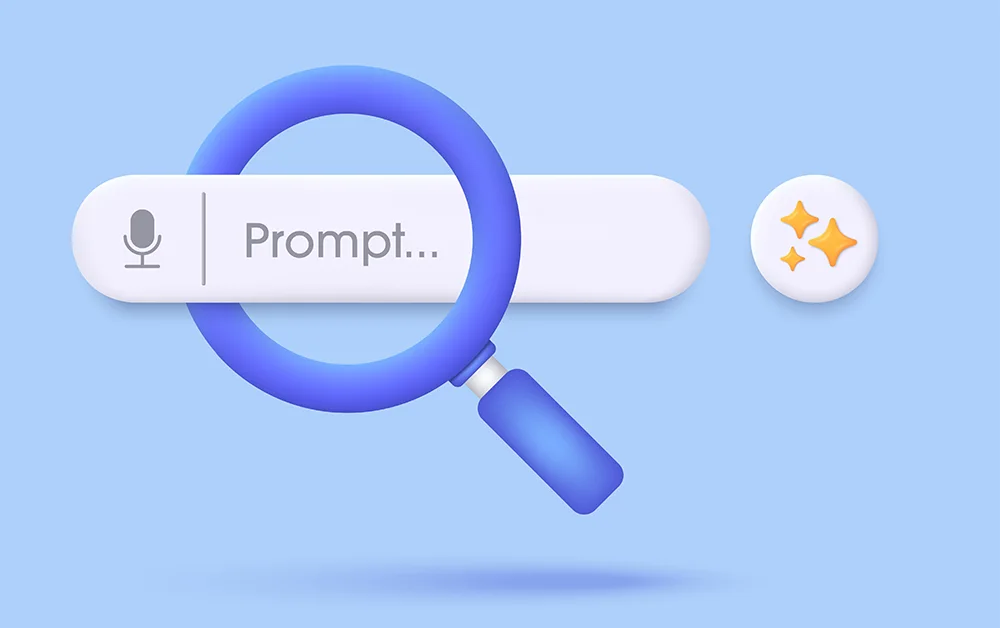The world of search marketing is undergoing a seismic shift, and it’s happening faster than most businesses realize. For years, the familiar blue links of Google’s search results page (SERP) were the primary destination for users. Marketers built their entire strategies around this predictable framework. Find the right keywords, write content, and get a top ranking. But that world is rapidly being replaced by one powered by artificial intelligence. Today, users are getting direct, AI-generated answers, a phenomenon exemplified by Google’s new AI Overviews. This isn’t just a future trend; it’s the present reality. The core message for any business is simple yet urgent: adapting your approach to AI in search marketing isn’t optional—it’s essential for survival and growth.
The initial reaction for many marketers is often fear. Will AI replace my job? What if users no longer click on my website? While these are valid concerns, the rise of AI presents an immense opportunity. The businesses that will win are those that pivot from merely targeting keywords to creating comprehensive, authoritative content that directly answers user intent. They will also be the ones who leverage AI tools for digital marketers to gain deeper insights and operate with unprecedented efficiency. This is a new frontier, and it’s time to navigate it.
The New Search Landscape: What’s Changed?

To understand how to adapt, you first need to grasp the fundamental changes AI and SEO are bringing to the search experience. The familiar blue links are now being augmented, and sometimes replaced, by rich, AI-generated summaries and direct answers. Users are interacting with search engines in more natural, conversational ways, expecting immediate and comprehensive solutions to their queries. This fundamental change means that a user’s journey often starts and ends on the search results page itself, redefining how and why people engage with your content. For marketers, this isn’t just a slight tweak to an existing strategy; it’s a complete paradigm shift that requires a new way of thinking about visibility and value.
The Rise of AI in Search Marketing: Overviews and Zero-Click Search
Google’s Search Generative Experience (SGE) is perhaps the most significant change. Instead of just a list of links, Google often provides a concise, AI-generated summary at the top of the page, pulling information from various sources to answer a user’s query directly. This has supercharged the trend of zero-click searches, where a user’s question is answered right on the SERP, eliminating the need to visit a website. For marketers, this means you can no longer rely solely on top rankings to drive traffic. Your content needs to be so valuable and authoritative that it’s chosen as a source for these AI-powered answers.
From Keywords to Concepts: Conversational & Multimodal Search

Users are no longer speaking to search engines in stilted, fragmented keyword phrases. Thanks to the rise of voice assistants and better natural language processing (NLP), queries are becoming more natural, conversational, and complex. Users ask full questions like, “What’s the best way to train for a half-marathon in under 12 weeks?” instead of “half-marathon training plan.” This shift also includes multimodal search, where users can use images or audio alongside text to find what they’re looking for, such as using Google Lens to identify a plant. The focus has moved from isolated keywords to understanding the user’s full intent and the complete concept behind their query.
The Rise of Perplexity and ChatGPT
The landscape isn’t just changing at Google. Alternative AI-powered search engines like Perplexity AI and conversational tools like ChatGPT are redefining user expectations. These platforms provide direct, coherent answers rather than a list of links. This competition is pushing traditional search engines to innovate even faster, forcing marketers to rethink their strategies and focus on creating content that is not just searchable but truly helpful and comprehensive.
Rethinking SEO: From Keywords to Concepts
You must shift your focus from optimizing for specific keywords to building comprehensive, high-quality content that addresses broader topics. This approach, known as creating topical authority, signals to AI models that your site is a credible expert in your field. It’s about demonstrating a deep understanding of a subject, not just a surface-level grasp of popular search terms. By establishing your site as a go-to resource, you increase your chances of being cited as a source in AI-powered search overviews and other generative results.
What is E-E-A-T in SEO?
The acronym E-E-A-T (Experience, Expertise, Authoritativeness, and Trustworthiness) is not new, but it’s more critical than ever. AI models are trained on vast datasets and are excellent at identifying credible, trustworthy sources. To optimize for Google AI Overviews and other generative results, you must signal to the algorithm that your content comes from an authoritative source.

Here’s how to put E-E-A-T into practice:
- Showcase credentials: Add author bios with a clear history of expertise. If a doctor writes a medical blog post, their credentials should be front and center. This adds a layer of human-centric trust, showing that a real, qualified person stands behind the information. For a business, this could mean highlighting key team members or a company’s years of industry experience.
- Cite credible sources: Link to reputable studies, data, and publications. This demonstrates that your information is well-researched and trustworthy. Think of it as building a case for your claims, backed by established evidence. Providing external links to these sources not only proves your point but also helps the AI understand the context and validity of your content.
- Earn backlinks: Secure links from other high-authority sites. Backlinks are a vote of confidence that signals your site is a trusted resource. When a well-respected site links to your content, it’s a powerful endorsement that tells both human readers and AI models your information is valuable. Focus on building genuine relationships and creating high-quality content that other experts will naturally want to reference.
The Power of Topical Authority
Forget keyword stuffing. The future of search marketing is topical authority. Instead of creating one-off blog posts for isolated keywords, you should build comprehensive “content hubs” or “topic clusters.” This involves creating a main, long-form “pillar page” that provides a high-level overview of a topic, and then interlinking it with several “cluster pages” that dive deep into specific sub-topics. For example, a main pillar page on “Digital Marketing for Small Businesses” could link to cluster pages on “Social Media Strategy,” “Email Marketing Automation,” and “Using AI for keyword research.” This network of interlinked articles signals to AI that you are a complete expert on the subject, making your content more likely to be featured in generative results.
The Non-Negotiable Role of Structured Data

Schema markup is the unsung hero of the new search era. Simply put, structured data is a form of code that helps search engines understand the context and content of your page. It’s like giving Google a cheat sheet for your website. This is crucial for getting your content featured in rich snippets, carousels, and now, AI-powered search results. By using a schema for FAQs, how-to guides, product reviews, and more, you make it easier for AI to parse your information and use it in its generative answers.
The Evolving Role of PPC in an AI World
The shift to AI doesn’t spell the end for paid search. In fact, PPC and AI can work together to form a more robust, comprehensive marketing strategy. The way we manage campaigns is changing, moving from manual, keyword-level optimizations to a more strategic, hands-off approach. AI is now taking over the heavy lifting of bidding, targeting, and ad delivery, allowing marketers to focus on the bigger picture. This evolution means your role is shifting from a campaign manager to a strategic architect, guiding the AI with the right assets and goals to achieve better results.
Synergy Between SEO and PPC
Adapting PPC for AI-driven search means understanding how it complements your organic efforts. A strong organic presence builds trust and brand recognition, which can increase the likelihood of a user clicking on your ad when they see it. In a world where organic clicks might decline, PPC offers an essential way to maintain visibility and drive immediate traffic, especially for high-value transactional queries. The future of search engine marketing is not about choosing one or the other but about making them work in tandem.
Leveraging AI in Ads Platforms

Google’s own ad platform is a testament to the power of PPC and AI. Performance Max campaigns, or PMax, are a prime example. Instead of manually bidding on keywords, marketers now provide the AI with a variety of creative assets (images, videos, text), audience signals, and conversion goals. The machine learning algorithms then take over, automatically optimizing for the best results on all of Google’s channels, including Search, Display, YouTube, and Gmail. The marketer’s role shifts from manual optimization to strategic management—ensuring the AI has the best possible ingredients to work with.
Ad Copy for Conversational Search
Just as organic content needs to adapt, so does paid ad copy. Ads must now be written to mirror the natural, conversational language of users. Ad copy should be solution-oriented and directly address the user’s problem. Instead of a generic headline like “Best CRM Software,” an ad that answers a question like “Which CRM is right for my small business?” will likely perform better in an AI-dominated landscape.
Essential Tools for AI in Search Marketing
There are powerful AI tools that can help you implement these strategies effectively. These tools are fundamentally changing the marketer’s role, automating tedious tasks and providing a level of data analysis that was previously impossible. They enable you to scale your content production, personalize user experiences, and gain deeper insights into your target audience. Instead of being a manual laborer, you become a strategic operator, leveraging AI to achieve better results with less effort.

Content & SEO
- ChatGPT/Gemini: These large language models are invaluable for brainstorming content ideas, outlining articles, and even generating the initial draft of schema markup for your pages. They can help you quickly identify sub-topics and build out your content hubs.
- SE Ranking: This all-in-one SEO platform is crucial for modern marketers. It not only helps with traditional keyword research and rank tracking but also allows you to analyze competitor strategies, monitor your site’s technical health, and identify new content opportunities based on evolving search trends.
PPC & Analytics
- Google’s Performance Max (PMax): As mentioned earlier, this is the primary tool for a modern PPC marketer. It represents the shift from manual work to strategic guidance.
- Google Analytics 4 (GA4): GA4, powered by machine learning, offers deeper insights into user behavior across different platforms. It helps you understand the entire customer journey, which is more important than ever as users interact with search in more complex ways.
AI in Search Marketing: Augmentation, Not Replacement

The age of AI in search is not about being replaced; it’s about being augmented. AI and search marketing are not mutually exclusive. The marketers who will thrive are those who embrace a strategic, human-first approach while leveraging AI tools to enhance their efficiency and effectiveness. Your role is shifting from a technician manually optimizing every detail to a strategist guiding a powerful machine. You still need to understand user intent, create valuable content, and build a trustworthy brand. The difference is that you now have an incredibly powerful partner—AI—to help you do it faster and on a larger scale.
The “how will AI affect SEO strategy?” question has been answered: it will force you to become better marketers, creating more valuable, authoritative content. The future of search isn’t a list of blue links, it’s a conversation—and you want to be a part of it.
Ready to future-proof your business and lead the way in the age of AI-powered search? Schedule a consultation with Gravitate One to transform your search marketing strategy and navigate this new frontier with confidence.
